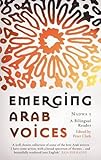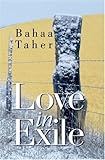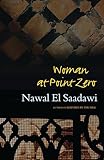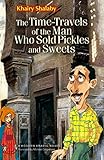In Cairo, in March, the city had a surplus of intellectual energy. Literature, it seemed, might just be at the vanguard of Egypt’s social change. Novelists were writing columns for every significant newspaper; the opinions of fiction writers like Alaa Al Aswany were hotly debated on satellite news channels and in streetside cafes, over backgammon.
I spent an afternoon at the Cairo’s Diwan Bookstore, talking to writers about their hopes — and anxieties — about the future. Just across the 6th of October Bridge in the Zemalek neighborhood, Diwan had an extensive collection of contemporary Egyptian novels, essays, and short stories. I bought a half-dozen books.
When I returned to to Portland, Oregon — I noticed the conspicuous absence of these books on the shelves of my city. Even at Powell’s, arguably the greatest (and largest) independent bookstore in the country, I couldn’t find Mansoura Ez Eldin’s first novel, the critically acclaimed, widely read Maryam’s Maze.
More writers from Egypt made the longlist for the $50,000, 2011 International Arabic Prize for Fiction (IPAF) than writers from any other country. And now it was Egypt’s Arab Spring. Where, where oh where, was the work of these men and women, work that was a catalyst for the ongoing social transformation of the largest nation in the Middle East?
Even if you’ve read The Yacoubian Building by Alaa Al Aswany, here’s a list of six Egyptian Writers you don’t know but you should.
(Hint: None of them is Naguib Mahfouz.)
1. Youssef Ziedan. It’s difficult to argue that there are more neglected Egyptian authors (in America) than the 53-year old Ziedan. Not only has he written fifty books — but he has also created a massive internet archive devoted to the translation and preservation of Islamic public memory. In 2008, he won the IPAF for his novel, Azazel, a highly-controversial reimagination of the life of a 5th-century Christian monk. The novel — which still has not appeared in English translation — angered Coptic Christian groups, who saw it as an attempt to Islamicize a segment of Christian history.
“This is my 54th book and I did not imagine it would trigger all this debate,” Ziedan told Egypt’s Dream TV, in an interview shortly after the novel’s publication.
Ziedan has dominated the bestseller lists in Egypt as of late. His nonfiction work, Arab Theology and the Roots of Religious Violence (2010), was one of the more widely read books in Cairo in the months before the January 25 Revolution.

 2. Mansoura Ez Eldin. A journalist, activist, and writer, Ez Eldin has published two novels. One, the slender volume, Maryam’s Maze, is a masterpiece of imagination and literary form. Her story, “Déjà Vu,” was also featured in Emerging Arab Voices — the bilingual reader published by Saqi Books in April of this year.
2. Mansoura Ez Eldin. A journalist, activist, and writer, Ez Eldin has published two novels. One, the slender volume, Maryam’s Maze, is a masterpiece of imagination and literary form. Her story, “Déjà Vu,” was also featured in Emerging Arab Voices — the bilingual reader published by Saqi Books in April of this year.
Ez Eldin’s account of the first days of the revolution appeared in The New York Times, in late January of this year — weeks before Mubarak’s resignation. “Silence is a crime,” she wrote. “Even if the regime continues to bombard us with bullets and tear gas, continues to block Internet access and cut off our mobile phones, we will find ways to get our voices across to the world, to demand freedom and justice.”
Maryam’s Maze tackles the issues so central to the experience of modernity in a metropolis like Cairo: Isolation, pollution, bureaucracy, madness. Awakening — like Kafka’s Gregor Samsa — in a world that she no longer recognizes, Maryam struggles to regain any semblance of her former life. It is a haunting book.

 3. Bahaa Taher. Arguably the greatest living Egyptian fiction writer, Taher is only now, at the age of seventy-six, gaining the international recognition he deserves. After a lifetime spent as a writer and translator — working on projects around the world — Taher’s novels are gradually trickling into English. AUC Press issued Love In Exile in 2004 — forty years after the publication of Taher’s first short story. And Taher’s novel, Sunset Oasis, won the IPAC in 2008.
3. Bahaa Taher. Arguably the greatest living Egyptian fiction writer, Taher is only now, at the age of seventy-six, gaining the international recognition he deserves. After a lifetime spent as a writer and translator — working on projects around the world — Taher’s novels are gradually trickling into English. AUC Press issued Love In Exile in 2004 — forty years after the publication of Taher’s first short story. And Taher’s novel, Sunset Oasis, won the IPAC in 2008.
After the translation of Sunset Oasis into English, the Times Literary Supplement said: “Taher’s voice is sombre, wise and lyrical.” And The Guardian echoed: “Bahaa Taher is one of the most respected living writers in the Arab world. At 73, he has weathered political purges and a lengthy exile from his native Egypt to carry off the Booker Prize for Arabic fiction. The recognition is long overdue.”
4. Muhammad Aladdin. A young lion of the Cairo literary scene, Aladdin began his career as a graphic novelist — publishing the youth-oriented, serial zine, Maganin (Mad People). Possessed of a mordant sense of humor — as well as an occasional passionate earnestness — Aladdin has begun publishing his work in American magazines.
His story, “New Lover, Young Lover,” appeared in The Cairo Portfolio in Issue 9 of A Public Space.
During the height of the revolution, Aladdin kept his friends apprised of his situation with his trademark wit: “Hello, am fine, just five rubber bullets in my leg but nothing serious.”
Only 31 years old, Aladdin has published five novels and over a dozen short stories.
5. Nawal el-Saadawi. It’s difficult to imagine an author having a more turbulent life than that of Nawal el-Saadawi.
 The eighty-year-old Egyptian women’s rights advocate has written a memoir about female circumcision — as well as numerous novels dealing with religious fundamentalism, abortion, sexuality, child abuse, and women’s oppression. A doctor by training — getting her medical degree in an era of deep discrimination against female physicians — el-Saadawi was named as Egypt’s Director of Public Health in 1972 — only to be stripped of that post several years later because of outrage surrounding her writing.
The eighty-year-old Egyptian women’s rights advocate has written a memoir about female circumcision — as well as numerous novels dealing with religious fundamentalism, abortion, sexuality, child abuse, and women’s oppression. A doctor by training — getting her medical degree in an era of deep discrimination against female physicians — el-Saadawi was named as Egypt’s Director of Public Health in 1972 — only to be stripped of that post several years later because of outrage surrounding her writing.
In the 1980s, el-Saadawi spent time in jail, and then fled to the United States, where she taught at Duke University and the University of Washington. She returned from exile in 1996, and stood with the revolutionaries in Tahrir Square in February of 2011.
Her book, The Woman at Point Zero, has long been hailed as an exemplar of the modern Arabic novel. It has been translated into dozens of languages and published around the world.
 6. Khairy Shalabi. The Time Travels of the Man Who Sold Pickles and Sweets is a strange and imaginative book, written by a master storyteller. It also has a fascinating title. A quirky appraisal of thousands of years of Egyptian history, Shalabi’s novel concerns a working-class contemporary Egyptian — and his endearing (if somewhat bumbling) travels through time. It’s a readable, enjoyable book.
6. Khairy Shalabi. The Time Travels of the Man Who Sold Pickles and Sweets is a strange and imaginative book, written by a master storyteller. It also has a fascinating title. A quirky appraisal of thousands of years of Egyptian history, Shalabi’s novel concerns a working-class contemporary Egyptian — and his endearing (if somewhat bumbling) travels through time. It’s a readable, enjoyable book.
And it’s not his first. In fact, the seventy-three year old Shalabi has published over seventy books in his lifetime — only three of which have thus far been translated into English.
And here the non-Arabic-speaking individual runs into the problem that looms over much Egyptian writing: Why, why oh why, does so little foreign literature appear in translation in the United States?
But that’s a different story for a different time.









